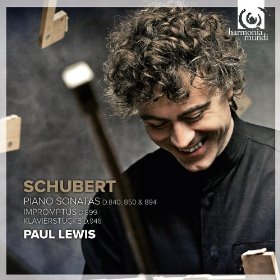Classical Music Review: Three Autumnal Schubert Sonatas
From the moment he began to play, pianist Paul Lewis established his authority. His performance was spellbinding and eloquent, animated by a respect for precision and rhythmic clarity.
By Susan Miron
Local musical cognescenti had high expectations regarding the acclaimed, 40-year-old, British pianist Paul Lewis, who, courtesy of the Celebrity Series of Boston, made his Boston debut at Jordan Hall last Saturday night. His excellent Beethoven recordings on Harmonia Mundi—the complete sonatas, the 5 Concerti, the Diabelli Variations—have won ecstatic critical raves (Anthony Tommasini of The New York Times declared Lewis’s recording of the complete Beethoven sonatas the single greatest version ever committed to disc). His Schubert recording (Piano Sonata D. 845, “Wanderer Fantasy,” D. 760, Four Impromptus, and Moments Musicaux, D. 780 among others) is excellent, reflecting the pianist’s total immersion in the scores and his impressive musical intelligence. Worthy of special note, Mr. Lewis’s “Wanderer Fantasy” is simply stupendous, the most thrilling version of the piece I’ve ever heard.
Mr. Lewis has been performing works from the last six years of Schubert’s life for the past two years. This program, the autumnal last three sonatas, were written shortly after the composer learned of his impeding death from syphilis. Mr. Lewis jestingly refers to this period as “the syphilitic years.” Schubert numbered the pieces sequentially, perhaps envisioning them as a cycle. The scores were sold to the publisher Diabelli after the composer died: it took 10 years for the sonatas to reach the public.
Like the last three sonatas of Beethoven, which Schubert often refers to in these pieces, the sonatas create an emotional world of melancholy, disconsolate beauty. Mr. Lewis sees these three pieces as dramatizing a journey from fear to acceptance, but that interpretation tends to trivialize them. Luckily, Mr. Lewis doesn’t do that for a second in his performance. In his interviews and on stage, the pianist is a serious man. He walks to his instrument, sits, plays, and then takes a bow before walking off. This is not a performer who thinks about winning over his audience with charisma and smiles.
Mr. Lewis was one of the few protégés of the now-retired pianist Alfred Brendel, similarly renowned for his thoughtful approach to Beethoven and Schubert. Neither has an ounce of flamboyance; both are intellectual performers in the best sense. I have attended many concerts featuring the three last Beethoven sonatas but have never (has anyone?) been to a performance of the three Schubert sonatas. Every Schubert-lover has a favorite last sonata performance. For many, Leon Fleisher’s magisterial 2004 rendition in Boston of the Sonata in B Flat Major, D. 960 (also available on CD) is a standout. Brendel himself played the B Flat during his retirement concerts.
From the moment he began to play, Mr. Lewis established his authority. His performance was spellbinding and eloquent, animated by a respect for precision and rhythmic clarity. Every note, it seemed, had been thought out with deliberation and executed with exactitude. Fast passagework, untold numbers of scales, staccato passages, singing lyricism—all were there when needed. The two plus hours of Mr. Lewis’s recital were full of musical illuminations; even the B Flat Major Sonata, the crowning glory of Schubert’s piano output, was full of revelations. Sometimes the piece was quieter and more tender than I was used to; at other times, there were surprising moments of muscularity and tension.
In interviews, Mr. Lewis has observed that “when Schubert wants to tell you something important, he will usually lower his voice rather than raise it. He draws you into the message rather than projecting it out to you.” Throughout, Lewis’s playing was unfussy, elegant, and interesting. His performance was particularly alluring and tender during each of the sontatas’ slow movements. Mr. Lewis has won a slew of awards for his CDs, and his live performance in Boston proved that he is worthy of the accolades.

